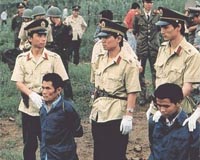 |
Beijing (UPI) Dec 29, 2009 China may have deservedly earned all the international accolades for its dazzling economic achievements, but two recent developments show its Communist regime is nowhere near winning similar praise for tolerating political dissidence or challenge to its authority in any form. In the first instance, China, going against pleas and urgings from around the world, handed an 11-year prison sentence to Liu Xiaobo, the country's widely respected ardent supporter of democracy and freedom of speech. In an equally disturbing move, China convinced Cambodia to deport 20 Uighurs who had fled to that country for political asylum to escape the crackdown on their fellow Turkic-speaking minority members by Chinese authorities for the ethnic riots last July in the far northwest Xinjiang-Uighur region. The 53-year-old Liu's trial in a Beijing people's court last week on subversion charges lasted only about three hours. His wife and foreign diplomats were not allowed to attend the proceedings, which preceded his Friday sentencing on charges of "inciting subversion of state power." The charges against Liu, who has been politically active since the 1989 Tiananmen Square democracy protest in Beijing, resulted from articles posted on the Internet and jointly authoring the "Charter 08" petition against one-party rule and urging human rights and free speech. The Washington Post, quoting a relative, reported that at the trial, Liu's lawyers were allowed only 14 minutes of speaking time. "Liu has been engaged in agitation activities, such as spreading of rumors and defaming of the government, aimed at subversion of the state and overthrowing the socialism system in recent years," according to a police statement reported by China's state-run Xinhua news agency. Human Rights Watch in New York said Liu, a prolific writer, has been detained, arrested and sentenced repeatedly for peaceful political activities since the late 1980s. HRW's Sophie Richardson, calling the trial a "travesty of justice," said its only purpose was "to dress up naked political repression in the trappings of legal proceedings" against non-existent crimes. China's response was that the international calls for Liu's release were "gross interference" in its internal affairs. A Chinese Foreign Ministry spokeswoman said those expressing such concerns should respect the country's judicial sovereignty. Commenting on the former university lecturer's prison sentence, Rebecca MacKinnon, a fellow at the Open Society Institute and co-founder of GlobalVoicesOnline.org, told the Post: "It certainly seems to reflect a high level of sensitivity and very low level of tolerance." There had been expectations among other Chinese dissidents that some of the reforms in recent years would lead to political modernization in step with the country's economic modernization, the Post report said. U.S. State Department spokesman P.J. Crowley was quoted as saying: "As far as we can tell, this man's crime was simply signing a piece of paper that aspires to a more open and participatory form of government. That is not a crime." In the incident relating to the Uighurs' deportation from Cambodia, China also said it was an internal matter as the 20 Uighurs were suspected of committing criminal offences, and urged the outside world not to make irresponsible remarks, the official Xinhua news agency reported. Chinese Foreign Ministry spokeswoman Jiang Yu said the "Chinese citizens" had broken the laws of both China and Cambodia by illegally crossing the border and that Cambodia had acted according to its immigration law. "China is a country under the rule of law. Judicial authorities will deal with these people's illegal criminal activities in accordance with the law and safeguard their legitimate rights," Jiang said. It is not clear what fate awaits the deported Uighurs, but last Friday a Chinese court sentenced five more people to death, bringing to 22 the total condemned to die for the July ethnic riots. The five were part of a new group of 22 suspects tried by a court in Urumqi, capital of the region where the July riots killed about 200 people. The others were sentenced from 10 years to life in prison. The July riots involved the minority Muslims Uighurs and the majority Han Chinese. Chinese officials have said most of the victims were Han Chinese. Tensions between the two groups have been simmering for a long time as the Uighurs resent being ruled by the Hans. Chinese Foreign Ministry spokeswoman Jiang, commenting on whether the deportation of Uighurs was linked to China's assistance to Cambodia, said both countries have maintained a comprehensive and cooperative partnership. "We provide assistance to Cambodia in line with our own capacity and without any strings attached," Xinhua quoted her as saying. However, two days after the 20 Uighurs were deported, China signed 14 business deals with the Cambodian government worth about $1 billion, The New York Times reported.
Share This Article With Planet Earth
Related Links China News from SinoDaily.com
 China executes British national, sparking outrage
China executes British national, sparking outrageBeijing (AFP) Dec 29, 2009 China executed a Briton said to have serious mental health problems for drug smuggling despite last-minute pleas Tuesday for clemency, drawing furious condemnation from London, the EU and rights groups. Britain's Prime Minister Gordon Brown said he was "appalled and disappointed" by the execution of Akmal Shaikh, a 53-year-old father-of-three who according to supporters had bipolar disorder. ... read more |
|
| The content herein, unless otherwise known to be public domain, are Copyright 1995-2009 - SpaceDaily. AFP and UPI Wire Stories are copyright Agence France-Presse and United Press International. ESA Portal Reports are copyright European Space Agency. All NASA sourced material is public domain. Additional copyrights may apply in whole or part to other bona fide parties. Advertising does not imply endorsement,agreement or approval of any opinions, statements or information provided by SpaceDaily on any Web page published or hosted by SpaceDaily. Privacy Statement |